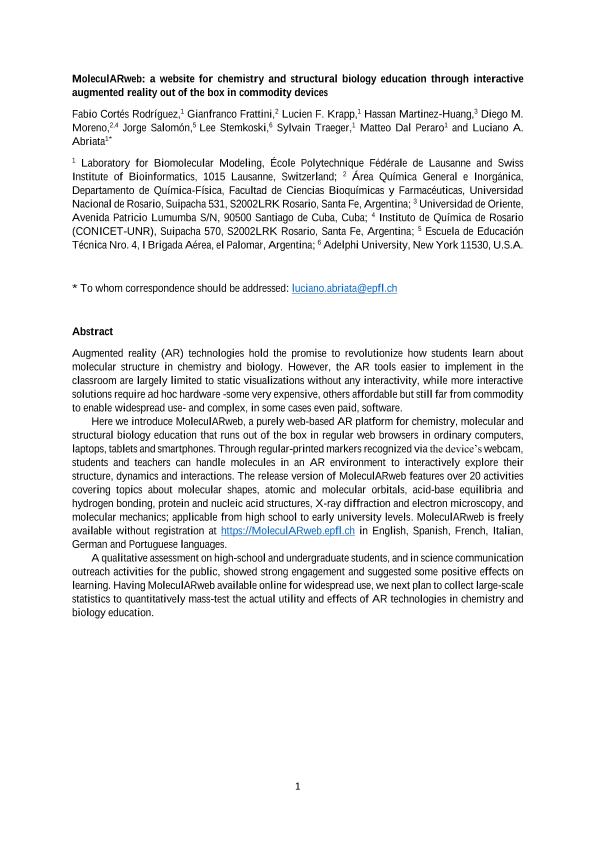Mostrar el registro sencillo del ítem
dc.contributor.author
Rodríguez, Fabio Cortés
dc.contributor.author
Frattini, Gianfranco

dc.contributor.author
Krapp, Lucien F.
dc.contributor.author
Martinez Hung, Hassan
dc.contributor.author
Moreno, Diego Martin

dc.contributor.author
Roldán, Mariana
dc.contributor.author
Salomón, Jorge Eduardo

dc.contributor.author
Stemkoski, Lee
dc.contributor.author
Traeger, Sylvain
dc.contributor.author
Dal Peraro, Matteo
dc.contributor.author
Abriata, Luciano Andres

dc.date.available
2022-01-18T13:22:14Z
dc.date.issued
2021-07
dc.identifier.citation
Rodríguez, Fabio Cortés; Frattini, Gianfranco; Krapp, Lucien F.; Martinez Hung, Hassan; Moreno, Diego Martin; et al.; MoleculARweb: A Web Site for Chemistry and Structural Biology Education through Interactive Augmented Reality out of the Box in Commodity Devices; American Chemical Society; Journal Of Chemical Education; 98; 7; 7-2021; 2243-2255
dc.identifier.issn
0021-9584
dc.identifier.uri
http://hdl.handle.net/11336/150206
dc.description.abstract
Augmented/virtual realities (ARs/VRs) promise to revolutionize STEM education. However, most easy-to-use tools are limited to static visualizations, which limits the approachable content, whereas more interactive and dynamic alternatives require costly hardware, preventing large-scale use and evaluation of pedagogical effects. Here, we introduce https://MoleculARweb.epfl.ch, a free, open-source web site with interactive AR webpage-based apps that work out-of-the-box in laptops, tablets, and smartphones, where students and teachers can naturally handle virtual objects to explore molecular structure, reactivity, dynamics, and interactions, covering topics from inorganic, organic, and biological chemistry. With these web apps, teachers and science communicators can develop interactive material for their lessons and hands-on activities for their students and target public, in person or online, as we exemplify. Thousands of accesses to moleculARweb attest to the ease of use; teacher feedback attests to the utility in online teaching and homework during a pandemic; and in-class plus online surveys show that users find AR engaging and useful for teaching and learning chemistry. These observations support the potential of AR in future education and show the large impact that modern web technologies have in democratizing access to digital learning tools, providing the possibility to mass-test the pedagogical effect of these technologies in STEM education.
dc.format
application/pdf
dc.language.iso
eng
dc.publisher
American Chemical Society

dc.rights
info:eu-repo/semantics/openAccess
dc.rights.uri
https://creativecommons.org/licenses/by-nc-nd/2.5/ar/
dc.subject
ACIDS/BASES
dc.subject
BIOCHEMISTRY
dc.subject
FIRST-YEAR UNDERGRADUATE
dc.subject
GENERAL PUBLIC
dc.subject
HIGH SCHOOL/INTRODUCTORY CHEMISTRY
dc.subject
INORGANIC CHEMISTRY
dc.subject
MOLECULAR BIOLOGY
dc.subject
MOLECULAR MODELING
dc.subject
ORGANIC CHEMISTRY
dc.subject
SECOND-YEAR UNDERGRADUATE
dc.subject
STEM EDUCATION
dc.subject
PEDAGOGY
dc.subject.classification
Otras Ciencias Químicas

dc.subject.classification
Ciencias Químicas

dc.subject.classification
CIENCIAS NATURALES Y EXACTAS

dc.title
MoleculARweb: A Web Site for Chemistry and Structural Biology Education through Interactive Augmented Reality out of the Box in Commodity Devices
dc.type
info:eu-repo/semantics/article
dc.type
info:ar-repo/semantics/artículo
dc.type
info:eu-repo/semantics/publishedVersion
dc.date.updated
2021-12-03T21:34:13Z
dc.journal.volume
98
dc.journal.number
7
dc.journal.pagination
2243-2255
dc.journal.pais
Estados Unidos

dc.journal.ciudad
Washington D. C.
dc.description.fil
Fil: Rodríguez, Fabio Cortés. École Polytechnique Fédérale de Lausanne; Suiza. Swiss Institute of Bioinformatics; Suiza
dc.description.fil
Fil: Frattini, Gianfranco. Universidad Nacional de Rosario. Facultad de Ciencias Bioquímicas y Farmacéuticas; Argentina
dc.description.fil
Fil: Krapp, Lucien F.. Ecole Polytechnique Federale de Lausanne; Francia. Swiss Institute of Bioinformatics; Suiza
dc.description.fil
Fil: Martinez Hung, Hassan. Universidad de Oriente; Venezuela
dc.description.fil
Fil: Moreno, Diego Martin. Consejo Nacional de Investigaciones Científicas y Técnicas. Centro Científico Tecnológico Conicet - Rosario. Instituto de Química Rosario. Universidad Nacional de Rosario. Facultad de Ciencias Bioquímicas y Farmacéuticas. Instituto de Química Rosario; Argentina
dc.description.fil
Fil: Roldán, Mariana. Provincia de Córdoba. Instituto Colbert; Argentina
dc.description.fil
Fil: Salomón, Jorge Eduardo. Provincia de Buenos Aires. Escuela de Educación Técnica Nro. 4; Argentina
dc.description.fil
Fil: Stemkoski, Lee. Adelphi University; Estados Unidos
dc.description.fil
Fil: Traeger, Sylvain. École Polytechnique Fédérale de Lausanne; Suiza. Swiss Institute of Bioinformatics; Suiza
dc.description.fil
Fil: Dal Peraro, Matteo. École Polytechnique Fédérale de Lausanne; Suiza. Swiss Institute of Bioinformatics; Suiza
dc.description.fil
Fil: Abriata, Luciano Andres. École Polytechnique Fédérale de Lausanne; Suiza. Swiss Institute of Bioinformatics; Suiza
dc.journal.title
Journal Of Chemical Education

dc.relation.alternativeid
info:eu-repo/semantics/altIdentifier/url/https://pubs.acs.org/doi/10.1021/acs.jchemed.1c00179
dc.relation.alternativeid
info:eu-repo/semantics/altIdentifier/doi/http://dx.doi.org/10.1021/acs.jchemed.1c00179
dc.relation.alternativeid
info:eu-repo/semantics/altIdentifier/url/https://chemrxiv.org/engage/chemrxiv/article-details/60c75046469df45970f4483e
dc.relation.alternativeid
info:eu-repo/semantics/altIdentifier/url/https://doi.org/10.26434/chemrxiv.13012463.v1
Archivos asociados
